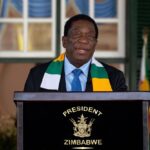HARARE – A bombshell has exploded onto Zimbabwe’s political landscape with the publication of a new book, “How Mnangagwa Blindsided Robert Mugabe and Grabbed Zimbabwe,” by former Central Intelligence Organisation (CIO) deputy director, Lovemore Mukandi.
In the book, and subsequent online interviews promoting it, Mukandi levels explosive allegations against President Emmerson Mnangagwa, his deputy Constantino Chiwenga, and the late Air Marshal Perrence Shiri, implicating them in a pre-meditated coup d’état in 2017, driven by a desire to avoid prosecution for their alleged roles in the Gukurahundi massacres.
Mukandi’s account paints a grim picture of the events leading up to the November 2017 coup. He contends that the plot was hatched not in the heat of the moment, but rather, meticulously planned over decades, stemming from the atrocities committed during the Gukurahundi era.
“This was long planned in the 1980s because Mnangagwa wanted to rule but realised he would not win elections,” Mukandi asserts.
The Gukurahundi, a dark chapter in Zimbabwean history, saw the North Korean-trained Fifth Brigade, under Shiri’s command, perpetrate the killing of an estimated 20,000 mainly Ndebele-speaking civilians in Matabeleland, Bulawayo, and Midlands provinces. Chiwenga, Mukandi alleges, also held a commanding role in the region during this period.
“You would find that Shiri, Chiwenga and some top officials in the CIO including Shirihuru and Muzariri were all involved in those atrocities and all reported to Mnangagwa who was coordinating them,” Mukandi reveals while highlighting the alleged complicity of Mnangagwa, Shiri, Chiwenga, Edson Shirihuru (a deputy director-general in the CIO), and Menard Muzariri.
The fear of future prosecution for these heinous crimes, Mukandi argues, was the primary motivator behind the coup.
“There was this fear among them arising from the fact that there was an outcry about this genocide that had been committed in Matabeleland and it was known to this group of people; Mnangagwa, Shiri, Chiwenga, Shirihuru, Muzaririri among others that one day they might have to account for these atrocities. Their fear was that they might face prosecution in future for these atrocities,” he explains.
Shiri, who earned the chilling moniker “Black Jesus” during the Gukurahundi era, a title reflecting his perceived absolute power over life and death, died in July 2020.
Mukandi’s narrative further alleges that the timing of the coup was strategically chosen to pre-empt a potential succession plan favoured by the then-President Robert Mugabe.
“I know for a fact from my interaction with Mugabe when I was deputy director general that he preferred Sydney Sekeramayi to be his successor,” Mukandi states.
This preference, he claims, was known to Mnangagwa, fueling his ambition to seize power unconstitutionally.
“These people who had been involved in atrocities in Matabeleland knew this was what was about to happen and feared that if power was handed over to someone they did not trust to protect them once in office then they would be in serious trouble as they might have faced prosecution. The November 2017 coup was meant to preempt the handover of power to somebody that Mnangagwa and company did not trust to protect them once they got into power, someone who might have prosecuted them. This is what motivated the coup,” he concludes.
Mukandi’s own history adds a layer of complexity to his claims. He fled to Canada at the turn of the millennium following his dismissal from the CIO, facing allegations of defrauding the agency. He was deported back to Zimbabwe in September 2011, although the subsequent trial never commenced.
The publication of Mukandi’s book promises to reignite intense debate and scrutiny of Zimbabwe’s political history, particularly the events surrounding the 2017 coup and the lingering legacy of the Gukurahundi massacres.












